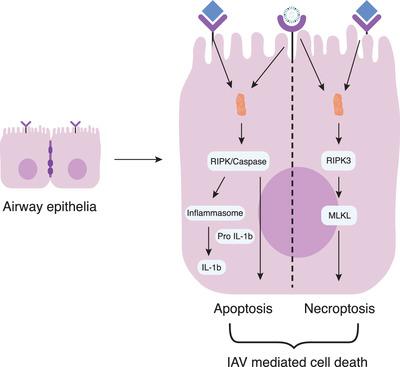当前位置:
X-MOL 学术
›
J. Leukoc. Biol.
›
论文详情
Our official English website, www.x-mol.net, welcomes your
feedback! (Note: you will need to create a separate account there.)
From virus to inflammation, how influenza promotes lung damage
Journal of Leukocyte Biology ( IF 3.6 ) Pub Date : 2020-09-08 , DOI: 10.1002/jlb.4ru0820-232r Mitchell Klomp 1 , Sumit Ghosh 2 , Sohail Mohammed 3 , M Nadeem Khan 1
Journal of Leukocyte Biology ( IF 3.6 ) Pub Date : 2020-09-08 , DOI: 10.1002/jlb.4ru0820-232r Mitchell Klomp 1 , Sumit Ghosh 2 , Sohail Mohammed 3 , M Nadeem Khan 1
Affiliation

|
Despite seasonal vaccines, influenza-related hospitalization and death rates have remained unchanged over the past 5 years. Influenza pathogenesis has 2 crucial clinical components; first, influenza causes acute lung injury that may require hospitalization. Second, acute injury promotes secondary bacterial pneumonia, a leading cause of hospitalization and disease burden in the United States and globally. Therefore, developing an effective therapeutic regimen against influenza requires a comprehensive understanding of the damage-associated immune-mechanisms to identify therapeutic targets for interventions to mitigate inflammation/tissue-damage, improve antiviral immunity, and prevent influenza-associated secondary bacterial diseases. In this review, the pathogenic immune mechanisms implicated in acute lung injury and the possibility of using lung inflammation and barrier crosstalk for developing therapeutics against influenza are highlighted.
中文翻译:

从病毒到炎症,流感如何促进肺损伤
尽管有季节性疫苗,但与流感相关的住院率和死亡率在过去 5 年中保持不变。流感发病机制有两个关键的临床组成部分;首先,流感会导致急性肺损伤,可能需要住院治疗。其次,急性损伤促进继发性细菌性肺炎,这是美国和全球住院和疾病负担的主要原因。因此,开发一种有效的流感治疗方案需要全面了解损伤相关的免疫机制,以确定干预措施的治疗靶点,以减轻炎症/组织损伤、提高抗病毒免疫和预防流感相关的继发性细菌性疾病。在本次审查中,
更新日期:2020-09-08
中文翻译:

从病毒到炎症,流感如何促进肺损伤
尽管有季节性疫苗,但与流感相关的住院率和死亡率在过去 5 年中保持不变。流感发病机制有两个关键的临床组成部分;首先,流感会导致急性肺损伤,可能需要住院治疗。其次,急性损伤促进继发性细菌性肺炎,这是美国和全球住院和疾病负担的主要原因。因此,开发一种有效的流感治疗方案需要全面了解损伤相关的免疫机制,以确定干预措施的治疗靶点,以减轻炎症/组织损伤、提高抗病毒免疫和预防流感相关的继发性细菌性疾病。在本次审查中,











































 京公网安备 11010802027423号
京公网安备 11010802027423号